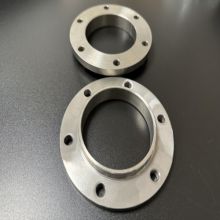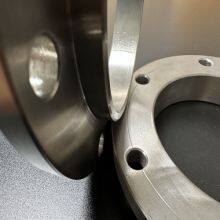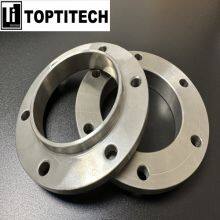A customized standard Gr1 titanium flange is a mechanical device used to connect pipes, valves, pumps, and other equipment to form a piping system. Flanges are available in different materials, and one of the most popular is titanium. Titanium flanges offer a range of benefits, including excellent corrosion resistance, high strength-to-weight ratio, and durability.
They are typically circular in shape and are classified based on their size and pressure rating. The formation of the flange involves bolting two circles together, with the number of bolts and bolt holes varying according to the pressure classification. The circular design of the flange allows for efficient distribution of stress and pressure, making it a reliable and essential component in piping systems.
Parameters
Specifications:ASTM B381 / ASME SB381
Standard:ANSI, ASME, BS, DIN, EN, etc.
Grades:Titanium Gr. 1, Titanium Gr. 2, Titanium Gr. 4, Titanium Gr. 5, Titanium Gr. 7
Class / Pressure:150#, 300#, 600#, 900#, 1500#, 2500#, etc.
Features
Corrosion Resistance: Titanium is highly resistant to corrosion, making it an ideal material for flanges used in corrosive environments. It resists corrosion caused by seawater, acids, alkalis, and other chemicals, making it an excellent choice for marine and chemical applications.
High Strength-to-Weight Ratio: Titanium is a lightweight metal with a high strength-to-weight ratio. This feature makes it perfect for use in applications where weight is a concern, such as aerospace and military. Despite its lightness, titanium is incredibly strong and can withstand significant pressure and stress.
Durability: Titanium has excellent durability, which means it can withstand harsh conditions and high temperatures without losing its strength or shape. This feature makes it ideal for use in applications such as power generation, chemical processing, and oil and gas industries.
Non-Magnetic: Titanium is a non-magnetic material, which makes it ideal for use in applications where magnetic interference is a concern, such as electronic equipment and medical devices. Its non-magnetic property also makes it suitable for use in MRI machines and other medical imaging equipment.
Applications
Aerospace and Defense: used in aircraft and missile components, including engine components, landing gear, and fuel systems.
Chemical Processing: used in chemical reactors, heat exchangers, and other equipment that comes into contact with corrosive chemicals.
Oil and Gas: used in offshore drilling rigs, pipelines, and subsea equipment.
Medical Devices: used in surgical instruments, implants, and medical imaging equipment.
Power Generation: used in power generation equipment, including gas turbine components, heat exchangers, and condensers. They offer excellent resistance to corrosion caused by high temperatures and harsh environments.

Send Inquiry to This Supplier
You May Also Like
-
Titanium Electrodes With Flow ChannelsUS$ 10 - 100MOQ: 1 Piece
-
Titanium Pipe for Exhaust and DownpipeUS$ 10 - 100MOQ: 1 Piece
-
Titanium Plate With Flow Field For ElectrolyzersUS$ 10 - 100MOQ: 1 Piece
-
Porous Ti Elements for Temperature and Humidity Sensor Protection CoverUS$ 5 - 100MOQ: 1 Piece
-
Titanium Bipolar Plate for Battery Fuel CellsUS$ 5 - 100MOQ: 1 Piece
-
Titanium Expanded Mesh 3*6mm Hole 1mm Thickness for Fuel CellUS$ 5 - 100MOQ: 1 Piece
-
Ruthenium Iridium Titanium Electrode for Hydrogen-rich Water CupUS$ 5 - 100MOQ: 1 Piece
-
20um Porous Titanium Plate for Electrolytic CellsUS$ 5 - 100MOQ: 1 Piece
-
TA1 Titanium Weave Mesh for Electromagnetic Shielding MeshUS$ 5 - 10MOQ: 1 Piece
-
The Multi-layer Titanium Mesh Sintered Plates for ElectrolysisUS$ 5 - 100MOQ: 1 Piece























